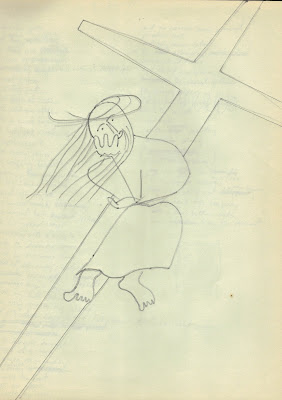Among the treasures uncovered while boxing backwards was an issue of TV Guide from the 1970’s that had been used as packing in a box of breakables. In flipping through its pages, the thought occurred that any of my readers old enough to remember those days-gone-by might enjoy reminiscing over the listings for some of the shows then current:

TV Guide listings: 1975
Apple’s Way xxxApple is upset when Paul and Kathy confide to him that incest is not all that it’s cracked up to be.
Kojack xxxRumors abound at NYPD when Kojak swears off sucking Tootsie Roll Pops and applies for transfer to the vice squad.
Ironside xxxIronside faces a crisis when a corrupt politician tells him to give up his investigation into graft in city hall or go back to walking a beat.
Medical Center xxxDr. Gannon comes under slanderous attack from an envious colleague after inventory disappears from the morgue and strange lights are seen flashing in his attic window.
Little House on the Prairie xxxCharles is kicked in the head by a mule and becomes convinced that an oddly-shaped buffalo chip is a gold nugget.
The WaltonsxxxJohn-Boy fears for his sanity when the mole on his cheek starts to whisper into his ear at night.
Movin’ On xxWill and Sonny come to blows when both call “shotgun” and neither will back down.
Mannix xxxIn solving a difficult case, Mannix survives more vicious blows to the head than any man since the first Ali-Frazier fight.
Tomorrow xxxTom Snyder hosts a discussion of peculiar practices among Turkistani goatherds. Also: Judge Crater makes a rare personal appearance.
Monday Night Football xxxCossell, Gifford and Mongo host an all-star line-up including John Wayne, Billy Graham, Former President Richard M. Nixon, the Jackson Five, and Dr. Irwin J. Stillman. Coverage of Rams-Steelers game, time permitting.
Petrocelli xxxPetrocelli corrects the sheriff’s pronunciation of his name once too often. Final show of series.
Chico and the Man xxxEd Brown blows his stack when Chico wants a day off to go to Tijuana to do research on “emission control devices.”
Kung Fu xxxAngry townsfolk threaten to burn Caine at the stake after several medically-certified local virgins are found to be pregnant.
Wide World of Sports xxxChris Shenkle provides live coverage of the world championship Amateur Geek Competition from Krakow. Taped coverage of the pro-am invitational three-legged race competition from Pocatella, Idaho. Also: in an exclusive interview, Evel Knieval announces his intention to sell the Brooklyn Bridge on closed-circuit television.
Leave It to Beaver xxxBeaver learns some new slang terms from an older boy at school and decides that he would prefer to be called Theodore after all.
X















.jpg)

























